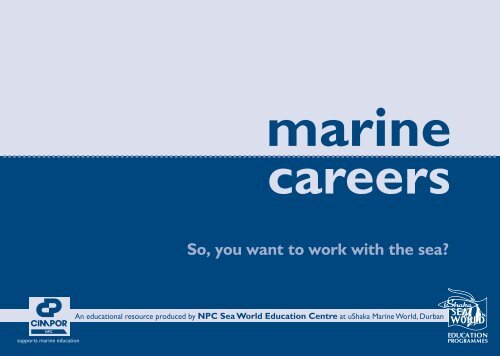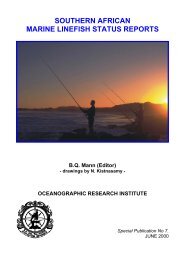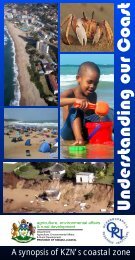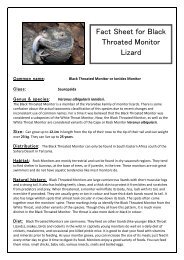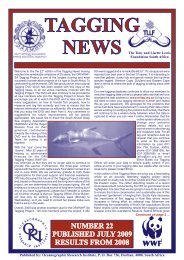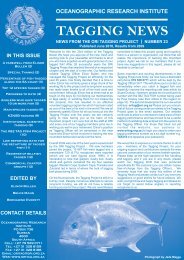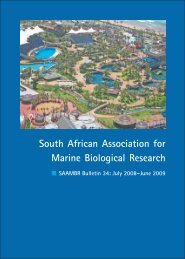Marine Careers 2011 1st issue - uShaka Sea World
Marine Careers 2011 1st issue - uShaka Sea World
Marine Careers 2011 1st issue - uShaka Sea World
Create successful ePaper yourself
Turn your PDF publications into a flip-book with our unique Google optimized e-Paper software.
marine<br />
careers<br />
So, you want to work with the sea?<br />
An educational resource produced by NPC <strong>Sea</strong> <strong>World</strong> Education Centre at <strong>uShaka</strong> <strong>Marine</strong> <strong>World</strong>, Durban<br />
supports marine education
Did you know?<br />
<br />
<br />
<br />
<br />
<br />
<br />
Over 70% of the Earth’s surface is ocean.<br />
Life on Earth is possible because of the oceans.<br />
YET we know more about the surface of the<br />
moon than we do about our oceans!<br />
Most oxygen used on land is generated in the<br />
world’s oceans.<br />
The Earth’s climate is driven by the oceans.<br />
Most of the solar energy that reaches the<br />
Earth is stored in the ocean and helps power<br />
oceanic and atmospheric circulation.<br />
60% of South Africans live within 100<br />
kilometres of the sea.<br />
The sea provides over one billion people with<br />
their primary source of protein.<br />
BUT 75% of the world’s fisheries are fully or<br />
over exploited.<br />
And many species of fish are less than 10% of<br />
their original stock levels.<br />
<br />
<br />
Over 450 cubic kilometres of waste is dumped<br />
into the sea each year.<br />
Widespread marine habitat destruction has left<br />
many coastal communities vulnerable.<br />
Why choose a marine career?<br />
Over half of the world's population lives in countries edging on the Indian Ocean.<br />
Most of these are developing countries that have a critical need for food security,<br />
development opportunities and sustainable use of their resources.<br />
As a growing global population stresses the ability of our society to produce food,<br />
water, shelter and energy, we will continue to look to the oceans to help sustain our<br />
basic needs.<br />
To survive, we will have to build upon our existing knowledge of the ocean and its<br />
potential to help meet the needs of the world and its inhabitants. And we urgently<br />
have to manage our interactions with this environment.<br />
From scientists to technicians and laboratory assistants... from divers to dolphin<br />
trainers... from resource managers to environmental educators... many different and<br />
exciting opportunities are available to those who want to pursue a career in the<br />
marine environment.<br />
This booklet, developed and produced by the NPC <strong>Sea</strong> <strong>World</strong> Education<br />
Centre, is an introduction to marine careers. Information touched on includes:<br />
different career options and areas of specialisation; tertiary qualification<br />
requirements; working conditions; and potential employment prospects.<br />
Learners are encouraged to research further, to make contact with institutions and<br />
organisations working in the marine environment, and to explore options for<br />
tertiary education and training.<br />
Most importantly, we encourage learners to discuss Grade 10-12 subject choices<br />
with their educators.<br />
2
aquarist<br />
coastal engineer<br />
commercial diver<br />
conservation officer<br />
fisheries economist<br />
looks after fish and other<br />
animals in an aquarium<br />
and ensures that the<br />
animals on exhibit are<br />
healthy and well fed.<br />
Aquarists may catch fish<br />
for exhibit and conduct<br />
research with a view to<br />
rearing or keeping<br />
different species in the<br />
aquarium.<br />
Where to begin:<br />
BSc with Zoology<br />
uses engineering<br />
techniques in the coastal<br />
zone and offshore<br />
environment. Coastal and<br />
ocean engineering is a<br />
branch of civil<br />
engineering and involves<br />
the development of<br />
harbours, recreational<br />
facilities, effluent outfalls<br />
and mining.<br />
Where to begin:<br />
BScEng specialising in<br />
Civil Engineering<br />
uses SCUBA equipment<br />
to do a wide range of<br />
different jobs under<br />
water. Commercial divers<br />
help to build piers or<br />
pipelines, or they can<br />
help to salvage (recover)<br />
the wrecks of ships that<br />
have sunk at sea.<br />
Where to begin:<br />
Class 4 commercial<br />
dive qualification<br />
(available at companies<br />
like Subtech or<br />
Professional Dive<br />
Centre)<br />
a marine conservation<br />
officer ensures the public<br />
are aware of and adhere<br />
to regulations associated<br />
with the harvesting of<br />
marine species. <strong>Marine</strong><br />
conservation officers play<br />
an important role in data<br />
collection ensuring better<br />
resource management.<br />
Where to begin:<br />
National Diploma in<br />
Nature Conservation or<br />
BSc or<br />
National Diploma in<br />
Fisheries Resource<br />
Management (available<br />
at CPUT)<br />
is concerned with the<br />
question of how people’s<br />
material needs can be<br />
satisfied by the marine<br />
environment with the aid<br />
of such resources as<br />
labour, capital, technology<br />
and entrepreneurship.<br />
Where to begin:<br />
BCom with<br />
specialisation or<br />
BEcon with<br />
specialisation<br />
<strong>Marine</strong> careers are very specialised and it is important to understand<br />
that in order to succeed, you must be prepared to spend a great deal of<br />
time and effort acquiring the necessary education and training.<br />
The first, and probably most important thing to consider is your choice<br />
of Grade 10-12 subjects. Subject choices directly influence what career<br />
opportunities will be available to you in the future, and which of these<br />
you will be in a position to explore. Your subject choices should match<br />
requirements for the specific tertiary training and education you will<br />
need to complete in order to pursue a particular marine career.<br />
This booklet offers you an introduction to what tertiary qualifications<br />
are necessary for specific marine careers, as well as suggestions on<br />
what and where to study. We encourage you to do further research<br />
and to contact the many institutions and organisations mentioned for<br />
specific information on entry requirements, syllabus and length of<br />
study.<br />
Remember... entrance into tertiary education institutions is by no<br />
means guaranteed, and you will be facing tough competition. Tertiary<br />
education is expensive, and bursaries are only offered to students who<br />
have good matric marks.<br />
3
fisheries scientist<br />
studies the numbers of<br />
different types of fish and<br />
other marine animals<br />
that are harvested by<br />
people. Fisheries<br />
scientists work out how<br />
much fish and other<br />
marine resources can be<br />
harvested sustainably.<br />
Where to begin:<br />
BSc followed by<br />
BSc (Hons) in<br />
Ichthyology/Fisheries<br />
Science/Aquaculture/<br />
Zoology (available at<br />
RU) followed by<br />
MSc in Icthyology/<br />
Fisheries Science<br />
mammal trainer mariculturalist marine biologist marine chemist<br />
marine mammal trainers<br />
care for, train, and do<br />
public presentations with<br />
dolphins, seals and other<br />
marine mammals.<br />
Where to begin:<br />
BSc or<br />
National Diploma in<br />
Nature Conservation or<br />
BA/BSocSci (Social<br />
Science) with<br />
Psychology major or<br />
BA with Drama major<br />
farms marine species<br />
under controlled or<br />
natural conditions.<br />
Where to begin:<br />
BSc followed by<br />
BSc (Hons) followed by<br />
MSc with specialisation<br />
studies the animals and<br />
plants that live in the sea.<br />
<strong>Marine</strong> biologists study<br />
the distribution,<br />
abundance and life cycles<br />
of organisms and may<br />
also study the biological<br />
interactions between<br />
different species and<br />
their environment.<br />
Where to begin:<br />
BSc followed by<br />
BSc (Hons) followed by<br />
MSc with specialisation<br />
investigates the<br />
processes determining<br />
the distribution and<br />
effect of chemicals,<br />
pollutants and micronutrients<br />
on the marine<br />
environment. They also<br />
search for natural<br />
products from the sea<br />
for food production, cure<br />
of diseases and industrial<br />
applications.<br />
Where to begin:<br />
BSc with Chemistry<br />
WHAT AND WHERE TO STUDY<br />
Are you interested in becoming a scientist conducting your own<br />
research? Are you more interested in the practical aspect of a marine<br />
career such as collecting material in the field or making and maintaining<br />
apparatus? Do you want to concentrate on marine education or<br />
marine conservation? Or are you specifically interested in working in<br />
an aquarium or becoming a dolphin trainer?<br />
These are important questions to consider as each of these fields<br />
involves different areas of study at tertiary level.<br />
MARINE SCIENCES<br />
Due to the wide variety of related scientific fields, the specialised<br />
training of a marine scientist only commences after completion of a<br />
BSc (Honours) degree in an ordinary science or engineering field.<br />
Entrance to the science faculty of most universities requires a<br />
matriculation exemption with a pass in Mathematics plus a comparable<br />
pass in at least one science subject such as Biology or Physical Science.<br />
A BSc degree is three years in duration.<br />
4
marine educator<br />
marine engineer<br />
marine geoscientist<br />
marine surveyor<br />
meteorologist<br />
plays a vital role in<br />
creating an awareness of<br />
the importance of the<br />
marine environment as a<br />
food, medicine,<br />
recreation, economic and<br />
spiritual source and<br />
equipping people, both<br />
young and old, with the<br />
appropriate information<br />
to live in harmony with<br />
this environment.<br />
Where to begin:<br />
BSc plus Post Graduate<br />
Certificate in<br />
Education or<br />
BEd with<br />
Science/Biology<br />
keeps ship engines,<br />
generators and<br />
associated systems like<br />
pumps, fuel purifiers and<br />
compressors in good,<br />
working order.<br />
Where to begin:<br />
BScEng specialising in<br />
Mechanical<br />
Engineering<br />
researches the processes<br />
forming the sea floor as<br />
well as the sediments and<br />
rocks at the bottom of<br />
the ocean and along the<br />
shoreline.<br />
Where to begin:<br />
BSc with Geology and<br />
Geography<br />
makes maps of the ocean<br />
floor. These maps show<br />
all of the features under<br />
the sea (just as a map of<br />
the land would), and help<br />
people to find their way<br />
around the oceans.<br />
Where to begin:<br />
BSc with Geology plus<br />
a course in marine<br />
surveying<br />
The Navy provides<br />
training for various<br />
careers including<br />
marine surveyor<br />
marine meteorologists<br />
study the ways that the<br />
oceans influence our<br />
weather and climate.<br />
They help to predict<br />
weather and climate by<br />
studying how the oceans<br />
distribute heat around<br />
the globe.<br />
Where to begin:<br />
BSc Meteorology<br />
(available at UP)<br />
followed by<br />
BSc (Hons)<br />
Meteorology<br />
An Honours degree is a further year of study.<br />
In addition to majoring in one or two of Botany, Zoology, Chemistry,<br />
Geology, Physics, Microbiology, Environmental or Cell Biology, the<br />
prospective marine scientist may include a course in Mathematics,<br />
Statistics and/or Computer Science in the degree.<br />
A carefully considered combination of minor subjects is also of vital<br />
importance. A degree in Engineering provides an excellent basis<br />
for specialisation in certain aspects of physical oceanography.<br />
Certain South African universities teach subjects with a marine science<br />
content at the honours level while a number of universities provide<br />
post-graduate training in aspects of marine science.<br />
It is important to contact these universities in order to find out exactly<br />
what courses are offered.<br />
Different universities offer different courses and it is important to<br />
ensure that the university you select offers the courses that interest<br />
you. Also, be sure to check entry requirements as these could differ<br />
from university to university.<br />
5
maritime lawyer<br />
works with and helps<br />
others to understand the<br />
laws that govern<br />
international maritime<br />
zones and marine<br />
resources.<br />
Where to begin:<br />
BA LLB followed by<br />
Post Graduate<br />
Diploma in Maritime<br />
Law (available at<br />
UKZN and UCT)<br />
oceanographer<br />
studies the ocean. There<br />
are many different types<br />
of oceanographers. For<br />
example, a physical<br />
oceanographer studies<br />
the physical properties of<br />
seawater and the forces<br />
that move it.<br />
Where to begin:<br />
BSc or<br />
National Diploma in<br />
Oceanography<br />
(available at CPUT)<br />
followed by<br />
BTech Oceanography<br />
followed by<br />
MTech Oceanography<br />
technician<br />
oceanographic<br />
technicians perform vital<br />
applied functions in many<br />
oceanographic categories.<br />
They may also focus on<br />
collecting specimens in<br />
the field, working in<br />
laboratories or on<br />
making and maintaining<br />
equipment.<br />
Where to begin:<br />
National Diploma in<br />
Oceanography<br />
(available at CPUT)<br />
South African Navy<br />
offers a choice of careers<br />
from officers’ posts such<br />
as combat officers and<br />
intelligence officers, to<br />
posts like surveying,<br />
navigation, catering or<br />
diving.<br />
Where to begin:<br />
The Navy provides<br />
training for various<br />
careers such as officer,<br />
submariner, etc. Visit<br />
their website at<br />
www.navy.mil.za<br />
environmental health<br />
the use of the sea for<br />
sewage and industrial<br />
effluent is increasing.<br />
Research on tides,<br />
currents and wave<br />
movements is of vital<br />
importance in areas<br />
where this is planned. It<br />
is also essential to have<br />
people monitoring water<br />
quality to determine the<br />
impact on the<br />
environment.<br />
Where to begin:<br />
National Diploma in<br />
Environmental Health<br />
followed by<br />
BTech Environmental<br />
Health<br />
TECHNICAL TRAINING<br />
For those who do not want to become scientists, there are several<br />
marine careers to consider. Laboratory technicians, draughtsman,<br />
electronics technicians and instrument makers are required on the<br />
ships and in laboratories, for example. Cape Peninsular University of<br />
Technology offers a National Diploma in Oceanography which<br />
concentrates on technical training in the marine field. This is a threeyear<br />
course, half of which is spent at a research establishment. A<br />
skipper’s or advanced diving qualification may also be required.<br />
For those interested in working in the field of marine conservation, the<br />
Nature Conservation Diploma offered at Technikon SA, Tshwane<br />
University of Technology, Mangosuthu University of Technology and<br />
Cape Peninsular University of Technology provides a good background.<br />
MARINE MAMMAL TRAINERS<br />
The qualifications required for a dolphin trainer are varied and each<br />
person is assessed on their individual experience and personal<br />
qualities. Qualifications in psychology, nature conservation, teaching,<br />
as well as speech and drama, are all worthwhile.<br />
6
Working conditions and employment possibilities<br />
If you are interested in working with the sea and pursuing a marine career, it is<br />
important to understand that employment possibilities, even for qualified people, are<br />
fairly limited. Success requires hard work, perseverance and (in many cases) higher<br />
qualifications.<br />
While rewarding and often exciting, a marine career should only be considered by<br />
dedicated and committed individuals.<br />
Working conditions vary according to the nature of the work being done and salaries<br />
are low in comparison to many other professions even though the work is demanding,<br />
specialised and vital to ensure the sustainable future of precious marine resources.<br />
Researchers can expect to spend time out in the field, be it at sea, on the beach or in an<br />
estuary. However, not all of a researcher’s time is spent in the field. For every hour<br />
spent in the field, many hours must be spent in the laboratory, in the library and in<br />
front of the computer, entering and analysing data or writing up the work. Diving may<br />
form one of the necessary activities in a researcher’s programme, but this will depend<br />
on the nature of the research.<br />
Technologists can expect to spend much of their time in the laboratory or in the field,<br />
while managers will often be office based. Education officers will be expected to work<br />
closely with people and will spend much time developing projects and working with<br />
children.<br />
People working with animals at an aquarium usually need a BSc(Hons) or a behavioral<br />
studies qualification. It is advantageous to have worked as a volunteer at an animal care<br />
facility (the SPCA, for example).<br />
You need to be comfortable working in an outdoor environment and be able to swim.<br />
SCUBA training may also be needed.<br />
<strong>Marine</strong><br />
<strong>Careers</strong><br />
a holiday workshop<br />
for Grade 9–12 learners<br />
run by the<br />
NPC <strong>Sea</strong> <strong>World</strong> Education Centre<br />
at <strong>uShaka</strong> <strong>Marine</strong> <strong>World</strong>, Durban<br />
Are you thinking of exploring a<br />
marine career? Run twice a year<br />
during school holidays, this<br />
workshop will introduce you to a<br />
variety of careers associated with the<br />
work done in an aquarium,<br />
dolphinarium and marine research<br />
institute.<br />
For more information and to book, please contact:<br />
NPC <strong>Sea</strong> <strong>World</strong> Education Centre<br />
Tel: (031) 328 8195/6<br />
Fax: (031) 328 8211<br />
E-mail: education@seaworld.org.za<br />
7
8<br />
Useful contacts, employment prospects and places of work<br />
Cape Peninsular University Murray & Roberts Construction <strong>Sea</strong> Harvest<br />
of Technology (CPUT) (Land and <strong>Marine</strong>)<br />
PO Box 29035, Maydon Wharf 4057<br />
PO Box 1906, Bellville 7535 PO Box 8212, Elandsfontein 1406 Tel: (031) 205 1822<br />
Tel: (021) 959 6911 Tel: (011) 820 4600 www.seaharvest.co.za<br />
www.cput.ac.za<br />
www.construction.murrob.com<br />
<strong>Sea</strong> <strong>World</strong><br />
Department of Ichthyology KwaZulu-Natal Sharks Board PO Box 10712, <strong>Marine</strong> Parade 4056<br />
Rhodes University (RU) P/Bag 2, Umhlanga Rocks 4320 Tel: (031) 328 8222<br />
PO Box 94, Grahamstown 6140 Tel: (031) 566 0400 www.seaworld.org.za<br />
Tel: (046) 603 80111<br />
www.shark.co.za<br />
www.ru.ac.za<br />
South African Institute for<br />
National Resources and the Aquatic Biodiversity<br />
Ezemvelo KZN Wildlife Environment<br />
P/Bag 101, Grahamstown 6140<br />
P/Bag X3, Congella 4013 CSIR<br />
PO Box 395, Pretoria 0001<br />
Tel: (046) 603 5800<br />
Tel: (031) 274 1150<br />
Tel: (012) 874 1291<br />
www.saiab.ru.ac.za<br />
www.kznwildlife.com<br />
www.csir.co.za<br />
South African Naval<br />
Institute of Oceanography<br />
Nelson Mandela Metropolitan Hydrographic Office<br />
University of Cape Town (UCT)<br />
University<br />
P/Bag X1, Tokai 7966<br />
P/Bag Rondebosch 7701<br />
PO Box 77000, Port Elizabeth 6031 Tel: (021) 787 2408<br />
Tel: (021) 650 3282<br />
Tel: (041) 504 2111<br />
www.sanho.co.za<br />
www.sea.uct.ac.za<br />
www.nmmu.ac.za<br />
The Oceanographic Research<br />
Irvin & Johnson<br />
Port Elizabeth Museum<br />
Institute (ORI)<br />
70 Prestwich Street, Greenpoint PO Box 13147, Humewood 6013<br />
Cape Town 8000<br />
PO Box 10712, <strong>Marine</strong> Parade 4056<br />
Tel: (041) 584 0650<br />
Tel: (021) 402 9200<br />
Tel: (031) 328 8222<br />
www.bayworld.co.za<br />
www.ij.co.za<br />
www.ori.org.za<br />
School of Geosciences<br />
Lusitania Food Products<br />
The South African Museum<br />
Wits University<br />
PO Box 17391, Dalebridge 4014 P/Bag 3, Witwatersrand 2050<br />
PO Box 61, Cape Town 8000<br />
Tel: (031) 466 1545 Tel: (011) 717 6547<br />
Tel: (021) 590 1570<br />
www.lusitania.co.za<br />
www.wits.ac.za/geosciences www.iziko.org.za<br />
<strong>Marine</strong> & Coastal Management South African Navy<br />
P/Bag X2, Rogge Baai 8001 SA Naval Headquarters<br />
Tel: (021) 402 3911 P/Bag X104, Pretoria 0001<br />
www.mcm-deat.gov.za<br />
www.navy.mil.za<br />
Two Oceans Aquarium<br />
PO Box50603, Cape Town 8002<br />
Tel: (021) 418 3823<br />
w w w.a q ua r i u m . c o .za<br />
University of KwaZulu-Natal<br />
(UKZN):<br />
King George V Avenue<br />
Durban 4001<br />
Tel: (031) 260 1111<br />
www.ukzn.ac.za<br />
University of KwaZulu-Natal<br />
(UKZN): Pietermaritzburg<br />
King Edward Avenue<br />
Scottsville 3201<br />
Tel: (033) 260 5111<br />
www.ukzn.ac.za<br />
Other Websites<br />
International <strong>Marine</strong> Animal<br />
Trainers Association:<br />
www.imata.org<br />
Association of Zoos and Aquaria<br />
(USA): www.aza.org<br />
This marine education<br />
resource was developed<br />
and produced by:<br />
NPC <strong>Sea</strong> <strong>World</strong><br />
Education Centre<br />
at <strong>uShaka</strong> <strong>Marine</strong> <strong>World</strong><br />
Tel: (031) 328 8195/6<br />
Fax: (031) 328 8211<br />
www.seaworld.org.za


